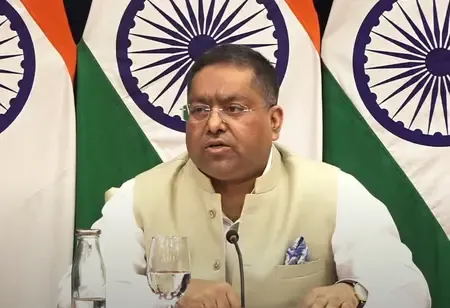Why is India Criticizing China's 'Preposterous' Naming Attempts in Arunachal Pradesh?

Synopsis
Key Takeaways
- India firmly rejects China's attempts to rename Arunachal Pradesh locations.
- The Ministry of External Affairs issued a strong statement reinforcing India's sovereignty.
- Concerns over China's hydropower projects highlight regional tensions.
- Arunachal Pradesh's Chief Minister voiced strong opposition.
- India remains vigilant in monitoring transboundary river developments.
New Delhi, May 14 (NationPress) India has fiercely criticized China for its ongoing and absurd attempts to rename various locations in Arunachal Pradesh, asserting that this northeastern state is an inseparable and vital part of India.
In response to media inquiries about the issue, the Ministry of External Affairs (MEA) issued a robust statement denouncing China's actions.
"China has continued its futile and ridiculous attempts to assign new names to places in Arunachal Pradesh. In line with our steadfast principles, we categorically reject these actions. Such creative renaming will not change the undeniable fact that Arunachal Pradesh was, is, and will forever remain an integral and inalienable part of India," the MEA declared.
Despite India's persistent objections, China allegedly unveiled its fourth list in April, renaming 30 locations in Arunachal Pradesh, a move that India interprets as a blatant violation of sovereignty.
Expressing his disapproval, Arunachal Pradesh Chief Minister Pema Khandu criticized the Chinese move in a social media post, stating, "This is yet another stunt from China. As a proud citizen of Bharat and a resident of Arunachal Pradesh, I vehemently condemn this act of renaming places within Arunachal Pradesh, which is an inalienable and integral part of India. The proud citizens and patriots of Arunachal Pradesh reject such provocations."
India has similarly dismissed previous renaming attempts by China, with the MEA reiterating its stance: "We firmly reject such actions. Assigning fabricated names will not alter the reality that Arunachal Pradesh is, has been, and will always be an integral and inalienable part of India."
In a separate concern, apprehensions are rising in India regarding China's hydropower initiatives in Tibet. In December 2024, China sanctioned the development of a major hydropower project on the lower reaches of the Yarlung Tsangpo River, which flows from Tibet into Arunachal Pradesh and Assam, known in India as the Brahmaputra.
India responded with caution and concern.
"We have noted the information released by Xinhua on December 25, 2024, concerning a hydropower project on the Yarlung Tsangpo River in the Tibet Autonomous Region of China. As a lower riparian state with established rights to the river's waters, we have consistently communicated our concerns regarding mega projects on rivers in their territory through both expert-level and diplomatic channels," MEA spokesperson Randhir Jaiswal remarked during a media briefing.
India remains alert to any developments upstream that could impact water flow and availability downstream.
Previously, China's 12th Five-Year Plan (2011–2015) proposed three hydropower projects on the main stream of the Brahmaputra in Tibet, the first of which—located at Jiacha—became operational in August 2020.
Subsequently, China's 14th Five-Year Plan, adopted in March 2021, confirmed plans for hydropower development on the lower reaches of the Brahmaputra River, raising strategic and environmental concerns in India.
The Indian government has reaffirmed its commitment to closely monitor all developments related to transboundary rivers and will take necessary actions to protect its interests while continuing to voice concerns with China through appropriate channels.










